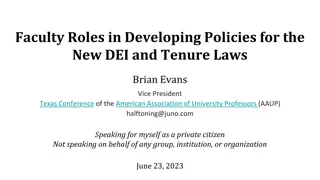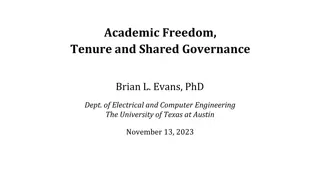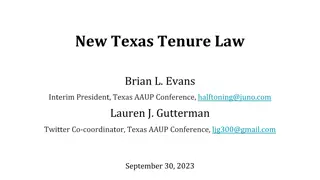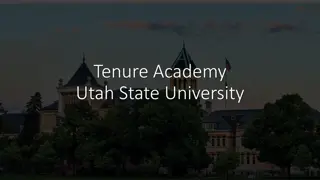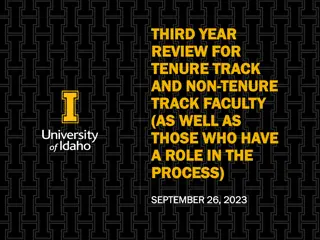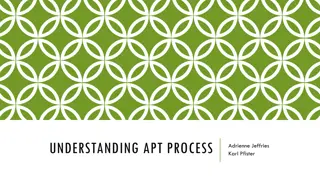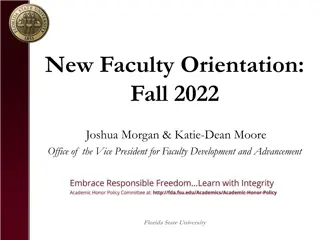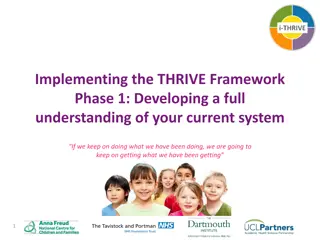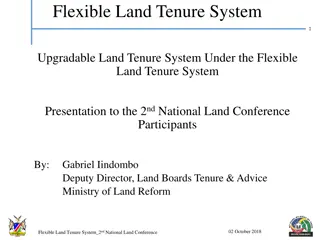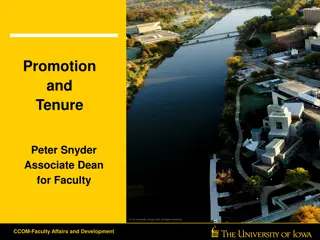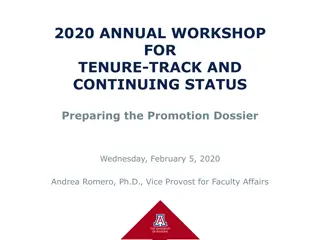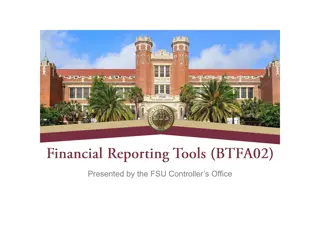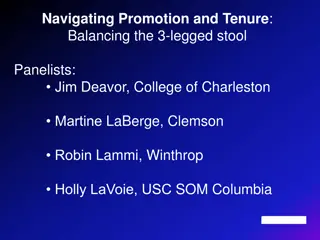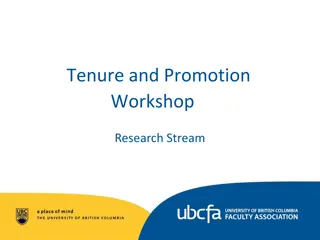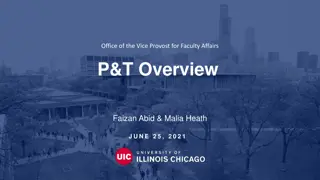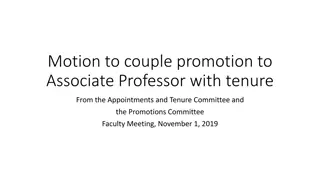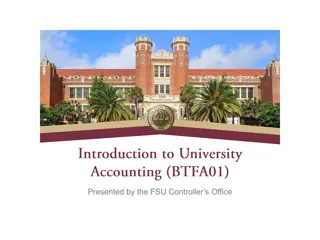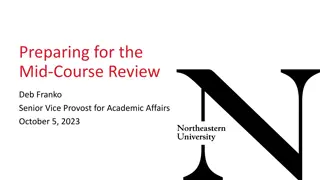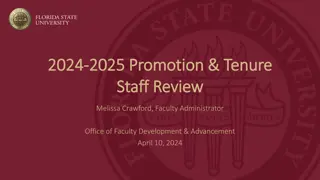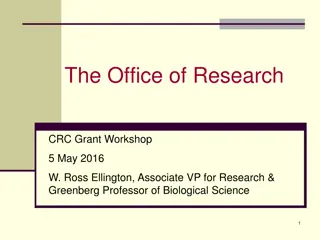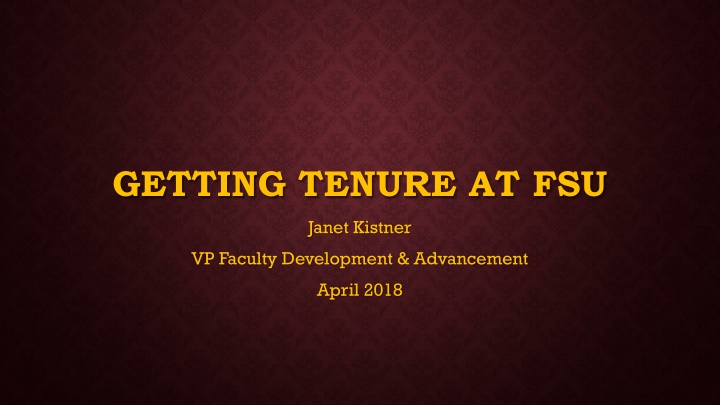
Tenure Process and Criteria at Florida State University (FSU)
Learn about the tenure process at FSU, including criteria for evaluation, typical timelines, and resources provided for faculty development. Understand the expectations for achieving tenure and progressing in your academic career.
Download Presentation

Please find below an Image/Link to download the presentation.
The content on the website is provided AS IS for your information and personal use only. It may not be sold, licensed, or shared on other websites without obtaining consent from the author. If you encounter any issues during the download, it is possible that the publisher has removed the file from their server.
You are allowed to download the files provided on this website for personal or commercial use, subject to the condition that they are used lawfully. All files are the property of their respective owners.
The content on the website is provided AS IS for your information and personal use only. It may not be sold, licensed, or shared on other websites without obtaining consent from the author.
E N D
Presentation Transcript
GETTING TENURE AT FSU Janet Kistner VP Faculty Development & Advancement April 2018
GETTING TENURE AT FSU Hiring & Tenure Decisions are the most important decisions we make Hired with the expectation that you will excel in your field Our commitment to you: Resources to launch your program of scholarship/creative works Support for teaching Positive work environment Constructive, timely feedback on your progress toward tenure
UNIVERSITY TENURE CRITERIA Meritorious performance in scholarly or creative accomplishments AND teaching AND service Is there evidence that you: have (or will) achieve national and international recognition as a scholar or creative artist in your field? are an effective teacher and mentor? make positive contributions in service to the university and your academic discipline?
HOW DO I KNOW IF IM MAKING HOW DO I KNOW IF I M MAKING PROGRESS TOWARD TENURE? PROGRESS TOWARD TENURE?
FACULTY EVALUATIONS AT FSU When do evaluations occur? Annually: ratings plus progress toward P&T letters 2nd& 4thyear reviews (mini-P&T reviews) P&T review Who evaluates you for tenure? Tenured faculty in your academic unit Department Committee & Chair College Committee & Dean University Committee Provost, President, Board of Trustees
TYPICAL TENURE TIMELINE* *FOR ASSISTANT PROFESSORS WITH NO TENURE CREDIT Spring semester of your 5thyear: department recommends that you put together materials for P&T review (or recommends waiting a year) Summer between your 5th& 6thyears: outside letters are requested by your chair/dean and you are asked to prepare your P&T binder Fall semester of your 6thyear: you submit your materials to the online P&T portal - the official start of your formal P&T review
TENURE TIMELINE (CONTD) Fall Semester of your 6thyear: September: Department/School vote October: College vote (in A&S, college vote is preceded by votes by the Humanities and Sciences committees December: University P&T Committee votes January: review by Provost & President Final Decision: typically January-February
WHAT EVIDENCE WILL REPRESENT YOU? Dean s and Chair s letters External letters (from top scholars in your field) C.V. Evidence of Achievements (publications/supporting materials) Research, Teaching and Service Statements Annual Letters of Progress toward P&T 2nd& 4thYear Review Narratives
PEER REVIEW, PEER REVIEW, PEER REVIEW .. Peer reviews of scholarship and creative works Peer reviews of grant proposals (in disciplines where external support is expected) Peer (and student) reviews of your teaching OUTSIDE LETTERS all about peer review
YOUR ROLE IN FACULTY EVALUATIONS Make it easy for your faculty colleagues, chair, dean to see what you ve accomplished Tell your story well What are your most important professional accomplishments? Why is your work important to the university, nation, world?
RESPONDING TO FEEDBACK Be open to the feedback you receive (If your chair/dean tells you that you are not performing at the level expected, don t question or debate the feedback) Ask questions to clarify expectations and ask for suggestions about ways to improve Thank your chair/dean for providing feedback it s the best thing a chair/dean can do for you is provide direct and timely feedback about your progress toward P&T
WHAT YOU CAN (SHOULD) DO NOW Ask about your academic unit s expectations of you and the criteria they most value in evaluating faculty performance Seek mentors (both at FSU and outside of FSU) Talk to recently tenured faculty colleagues to learn more about the process in your academic unit
NCFDD Core Curriculum The NCFDD s Core Curriculum is designed to teach 10 Key Skills that lead to thriving in the Academy.
HOW TO MAXIMIZE YOUR SUCCESS Stay focused on your goals Maintain connections with leaders in your field of study Seek mentors Remember your timeline (amazing how fast the years go by) Protect your time (but say yes to projects/tasks that will advance your career) If you say you re going to do something, do it well and on time

